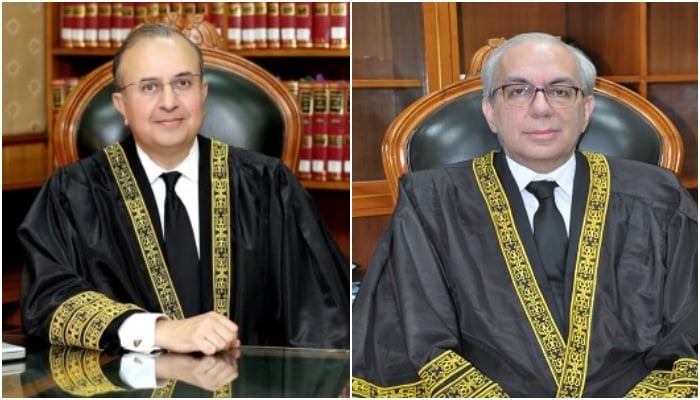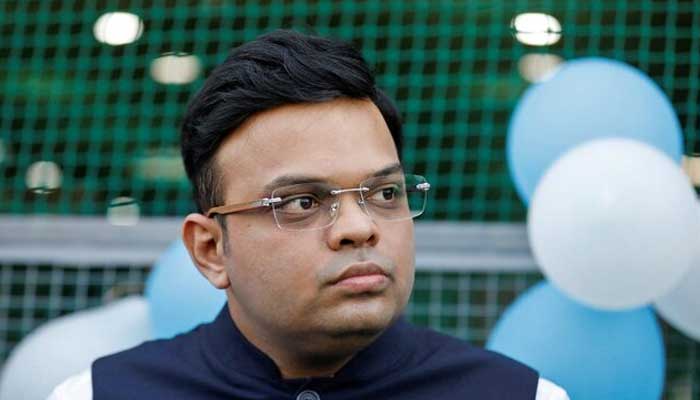

- Judge says new body’s decision may undermine court’s credibility.
- Stresses importance of collegial decision-making within judiciary.
- States no reasons given for Justice Akhtar’s removal from committee.
Senior puisne judge Justice Mansoor Ali Shah has expressed concerns over newly promulgated Supreme Court (Practice and Procedure) Amendment Ordinance that deals with the affairs of the top court including the formation of benches.
In a letter written to the secretary of the Supreme Court on Monday, Justice Shah said within hours of the promulgation of the ordinance, the judges committee was reconstituted and Justice Munib Akhtar was removed from the composition of the committee.
Last week, Chief Justice of Pakistan (CJP) Qazi Faez Isa appointed Justice Amin-Ud-Din Khan to the three-member judges' committee, excluding Justice Munib Akhtar hours after the promulgation of the new practice law.
The newly amended law grants additional powers to the chief justice to nominate a judge as a member of a committee, if a member of the committee is absent. The ordinance also gave the CJP authority to assign cases.
Justice Mansoor, in his letter, noted that no reasons were given as to why the second senior most judge, Justice Akhtar, was removed from the composition of the Committee. “Furthermore, no reasons were given why the next senior most judge was ignored and instead, the fourth senior most judge was nominated as a member of the Committee.”
“Such unfortunate cherry picking and undemocratic display of one-man show are precisely what the Act tried to discourage and replace-a stance that was upheld by the Full Court Bench of this Court in Raja Amer,” he wrote.
Justice Mansoor also emphasised importance of collegial decision-making within the judiciary, saying that "the principle of collegial working stands as a cornerstone for ensuring justice, fairness, and the larger good of the people who seek its intervention”.
“The concentration of ultimate administrative powers in the hands of a single individuals, such as the Chief Justice. runs counter to the ideals of democratic governance and judicial fairness,” he wrote, referencing the Supreme Court’s own ruling in the Raja Amer case.
The senior puisne judge pointed out that a full-bench of Supreme Court upheld the while upholding the constitutional validity of the Act in Raja Amer held:
(i) Article 191 of the Constitution of Pakistan vests the initial and primary power to make rules for regulating its practice and procedure in the Supreme Court of Pakistan, whereas the power vested in the Legislature to enact a law on this subject is like a check on the rule-making power of the Supreme Court to be seldom exercised only when it is necessary to do so in the public interest.
(ii) and the Act has facilitated access to justice, instilled transparency, made the realization of Fundamental Rights more effective, and the Supreme Court more independent.
“With foresight and wisdom, this Court closed the door to any future intrusion or encroachment by the Parliament, under the rubric of the Act, upon the independence of this Court, by holding that if any such amendment is made, or attempted to be made, in order to compromise or impair the independence of the judiciary, this Court being the custodian of the Constitution, would be there to deal with the same”, it added.
He also expressed concern over the urgency in promulgating the ordinance, saying: "The constitutional conditionality of the very act of promulgating the amending Ordinance also requires judicial determination as no urgency has been spelled out that necessitated its promulgation, instead of a proper amending enactment through the Act of Parliament."
Furthermore, Justice Shah also called for a full court meeting to review the ordinance, stating, "Independence, transparency, and collegiality required the Chief Justice to raise an immediate alarm and concern on the promulgation of the amending Ordinance in the light of the Court's celebrated pronouncement in Raja Amer."
He warned that any decisions made by the reconstituted committee could undermine the court's credibility and violate the Full Court Bench's decision in Raja Amer case.
“Until the constitutional validity of the amendments made by the amending Ordinance is determined by the Full Court Bench of this Court, or the judges of this Court resolve to act upon the amendments in a Full Court meeting on the administrative side, I, with respect, regret that I cannot participate in the meetings of the Committee," the judge concluded.











